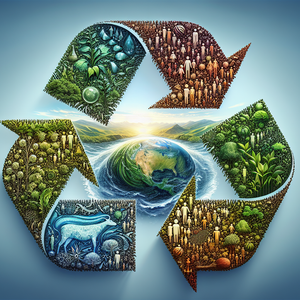The Green Entrepreneurial Leap: Building a Sustainable Business from Your NOAA Experience

The transition from a government or scientific role into entrepreneurship may seem like a leap into the unknown, but the timing couldn’t be better. The global market for sustainable solutions is expanding rapidly. According to the International Energy Agency (IEA), more than $1.7 trillion was invested in renewable energy and energy efficiency in 2022 alone. Similarly, consumers and corporations are increasingly prioritizing sustainability, creating a fertile landscape for green entrepreneurs. For NOAA professionals, this is a logical next step. Your years of working with cutting-edge science, analyzing environmental systems, and developing data-driven solutions are invaluable in a world hungry for actionable ways to combat climate change. As an entrepreneur, you can bridge the gap between scientific innovation and practical implementation, helping businesses, communities, and individuals transition to more sustainable practices.
Promising Green Business Opportunities
As a NOAA-trained environmental scientist, your skillset aligns perfectly with a wide range of green business opportunities. Here are some of the most promising areas to explore: 1. Eco-Consulting Services: Companies across industries are under increasing pressure to adopt sustainable practices due to consumer demand, government regulations, and stakeholder expectations. However, many lack the expertise to make their operations eco-friendly. This is where eco-consulting services come in. For example, if you specialized in climate modeling at NOAA, you could offer climate risk assessments to corporations aiming to future-proof their operations. Similarly, your knowledge of environmental regulations can help businesses navigate compliance challenges while reducing their environmental footprint. By positioning yourself as a consultant, you not only help companies transition to greener practices but also create a financially rewarding career for yourself. 2. Renewable Energy Solutions: The renewable energy sector is thriving, with advancements in technologies such as solar, wind, and geothermal energy. As someone with NOAA expertise, you could launch a business focused on renewable energy consulting, system design, or installation. For instance, if you have engineering or technical experience, you could start a company installing solar panels or wind turbines for residential and commercial clients. Alternatively, your knowledge of energy efficiency and resource management could allow you to consult on optimizing energy systems for businesses, reducing both costs and emissions. 3. Sustainable Product Development: The demand for eco-friendly products is at an all-time high. From biodegradable packaging to reusable household items, consumers are seeking alternatives to traditional, wasteful products. NOAA scientists can play a pivotal role in developing sustainable goods by leveraging their understanding of environmental standards, materials science, and lifecycle assessments. Imagine creating a company that develops products from reclaimed ocean plastics or designs biodegradable alternatives to single-use plastics. By combining your environmental expertise with consumer demand, you can build a business that’s profitable and planet-friendly. 4. Environmental Data Analytics: As a NOAA scientist, you’ve likely worked with extensive datasets on weather, climate, or ecosystems. This expertise can be harnessed to provide data analytics services to industries like agriculture, real estate, insurance, or urban planning. Businesses across sectors are increasingly reliant on data to make informed decisions, and your ability to interpret and apply environmental data could set you apart. Consider starting a company that offers services like climate risk modeling for insurance firms, weather pattern analysis for farmers, or urban heat island assessments for city planners. This niche business model leverages NOAA’s core strengths while filling a critical industry need. 5. Educational Ventures: Another avenue for green entrepreneurship is education and awareness. By creating educational programs, workshops, or materials, you can empower communities to adapt to environmental challenges. For instance, a NOAA expert in oceanography could lead workshops on coastal resilience for communities vulnerable to rising sea levels. Educational businesses can also target schools, nonprofits, or corporations looking to improve their sustainability knowledge. Whether through in-person training sessions or online platforms, education-driven ventures allow you to share your NOAA expertise while making a tangible impact.
Actionable Steps for Aspiring Green Entrepreneurs
Transitioning to entrepreneurship requires careful planning and a willingness to step outside your comfort zone. Here are practical steps to guide you through the process: 1. Identify Your Niche: Reflect on your NOAA experience and think about how your expertise aligns with market demands. Are you passionate about renewable energy? Do you excel at interpreting climate data? Identifying a specific niche will help you focus your efforts and stand out in a competitive market. 2. Develop a Business Plan: A strong business plan is crucial for turning your vision into reality. Outline your objectives, target market, revenue streams, and marketing strategies. Use tools like the Business Model Canvas to create a detailed plan that guides your decision-making. 3. Leverage Your Network: Your time at NOAA has likely connected you with a network of scientists, policymakers, and environmental organizations. Reach out to these contacts for advice, mentorship, or potential partnerships. Networking can also help you find early clients or collaborators for your business. 4. Secure Funding: Green businesses often qualify for grants, loans, and incentives aimed at promoting sustainability. Research programs like the Small Business Innovation Research (SBIR) grants or local clean energy initiatives to access funding opportunities. Crowdfunding platforms are another option for raising capital. 5. Embrace Continuous Learning: Entrepreneurship involves wearing many hats, from marketing to financial management to customer service. Take advantage of online courses, mentorship programs, and industry events to build the skills you need to succeed.
Success Stories: Inspiration from Green Entrepreneurs
The journey from environmental scientist to green entrepreneur is well-trodden by innovators who have turned their expertise into impactful businesses. Here are some inspiring examples: Melissa McGinnis, Founder of Greenopolis: McGinnis created a recycling rewards program that incentivizes eco-friendly behaviors through gamification, demonstrating how sustainability can be both engaging and profitable. Dr. Ayana Elizabeth Johnson, Co-Founder of Urban Ocean Lab: A marine biologist, Dr. Johnson founded a think tank dedicated to creating climate-resilient solutions for coastal cities, blending her scientific background with policy advocacy. Mike Biddle, Founder of MBA Polymers: Biddle used his engineering expertise to create a company specializing in recycling complex plastics, reducing waste and creating sustainable materials for manufacturers. These stories highlight the potential for environmental scientists to make a significant impact through entrepreneurship.
For NOAA professionals, green entrepreneurship offers an unparalleled opportunity to apply your skills in ways that drive both personal success and global sustainability. Whether you’re consulting on renewable energy, developing eco-friendly products, or educating communities about climate resilience, your expertise is a valuable asset in the fight against environmental degradation. Transitioning to entrepreneurship may be challenging, but the rewards—financial independence, professional fulfillment, and the chance to make a meaningful difference—make it worth the effort. As the world grapples with the urgency of climate change, there has never been a better time to take the leap. By stepping into the role of a green entrepreneur, you have the power to shape a more sustainable future for generations to come.
Renewable Energy Project Manager
Siemens Gamesa, Ørsted, NextEra Energy
Responsibilities
Oversee the planning, execution, and monitoring of renewable energy projects, such as solar farms or wind turbine installations.
Coordinate multidisciplinary teams, including engineers and environmental scientists, to ensure project milestones are met.
Skills & Qualifications
Requires expertise in renewable energy systems, project management certifications (e.g., PMP), and experience with permitting processes and regulatory compliance.
Unique Skillset
Strong understanding of energy policy and grid integration is often valued to navigate the complexities of renewable energy deployment.
Environmental Data Scientist
Google (Google Earth Engine), ERM, government agencies
Responsibilities
Analyze large datasets related to climate, weather, or ecosystems to provide actionable insights for industries like agriculture, urban planning, or insurance.
Develop predictive models to assess risks such as flooding, drought, or heat islands.
Skills & Qualifications
Proficiency in programming languages like Python or R, experience with GIS tools, and a background in environmental science or statistics are essential.
Unique Skillset
Ability to translate complex data into practical recommendations for decision-makers in non-technical industries.
Sustainability Consultant
BCG, Deloitte’s Sustainability Practice
Responsibilities
Help businesses assess their environmental impact and create strategies to reduce carbon footprints, improve resource efficiency, and comply with sustainability regulations.
Lead environmental audits and craft tailored action plans.
Skills & Qualifications
Knowledge of ESG (Environmental, Social, and Governance) frameworks, corporate sustainability standards (e.g., GRI or CDP), and strong project management skills.
Unique Skillset
Familiarity with life-cycle assessments (LCAs) and carbon accounting tools like SimaPro or CarbonTracker can be a differentiating factor.
Ocean Sustainability Specialist
Oceana, academic institutions, private firms investing in blue economy projects
Responsibilities
Develop and implement projects that protect marine ecosystems, such as coral reef restoration or sustainable fisheries initiatives.
Work with policymakers, NGOs, and private companies to promote ocean health and resilience.
Skills & Qualifications
Expertise in marine biology, oceanography, or resource management.
Strong communication skills are essential for stakeholder engagement and advocacy.
Unique Skillset
Experience with NOAA tools like Fishery Stock Assessment Models or GIS-based marine spatial planning platforms is highly sought after.
Green Product Designer
Patagonia, Unilever, startups focused on green technologies and consumer goods
Responsibilities
Design and develop sustainable consumer products, such as biodegradable packaging, reusable alternatives to single-use plastics, or eco-friendly textiles.
Collaborate with engineers, marketers, and supply chain teams to bring concepts to market.
Skills & Qualifications
Requires a background in materials science, industrial design, or environmental engineering.
Familiarity with sustainable sourcing and manufacturing processes is crucial.
Unique Skillset
Expertise in circular economy principles and experience conducting environmental impact assessments for product life cycles can set candidates apart.


